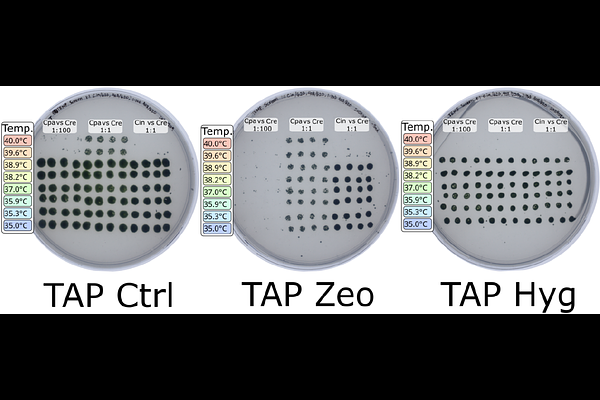Low-Cost Screening of Algae for Extreme Tolerance to pH, Temperature, Salinity, and Light

Low-Cost Screening of Algae for Extreme Tolerance to pH, Temperature, Salinity, and Light
Barbara Saucedo, B.; Kang, K.; May, L.; Gupta, A.; do Espirito Santo, E.; Mayfield, S.; Dutra Molino, J. V.
AbstractBioprospecting algae strains with tolerance to extreme conditions such as pH, temperature, salinity, and light is crucial for advancing biotechnology and environmental applications. However, traditional screening methods often involve significant costs and labor, restricting their accessibility and practical use. In this study, we developed and validated low-cost, high-throughput screening techniques, predominantly employing agar plates and liquid culture assays, to effectively differentiate tolerance levels among various algae strains. The methodologies were optimized using the model microalga Chlamydomonas reinhardtii and its closely related species Chlamydomonas incerta and the recently discovered extremophilic Chlamydomonas pacifica. We systematically evaluated the algae for tolerance to extremes by establishing precise gradients of pH (acidic to alkaline conditions), salinity (0 to 5 M NaCl), temperature (34 - 42C), and light intensity (40 to 2977 microE/m2s1). Our results demonstrated that these cost-effective, agar plate-based methods effectively distinguished algae strains exhibiting superior tolerance to extreme environmental conditions. These screening techniques not only provided clear differentiation among the closely related strains but also delivered reproducible outcomes suitable for scaling up to larger bioprospecting efforts. Furthermore, the affordability and simplicity of these methods facilitate their implementation in resource-limited laboratories, thereby broadening participation in algae bioprospecting endeavors. This study highlights the potential of low-cost, accessible screening techniques to significantly enhance the discovery and characterization of algal strains with extreme traits. Ultimately, these methods support the development of robust algae-based resources, driving innovation in diverse industrial processes and environmental solutions.